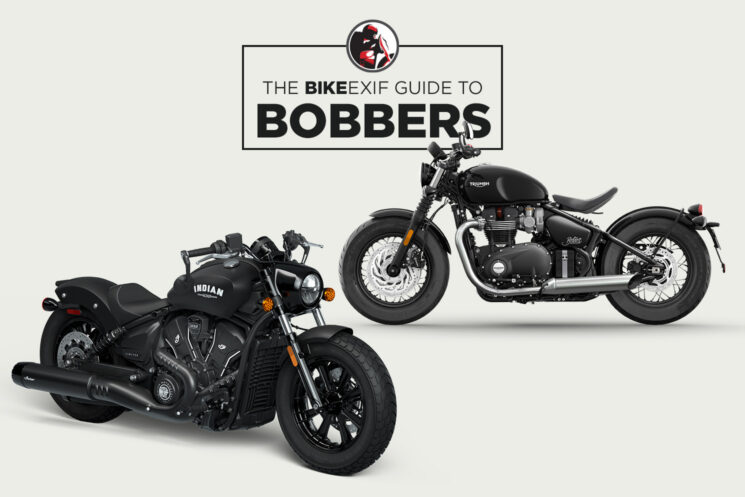
Strip it back to the bare essentials, and make it lighter, faster and cooler. It’s a recipe for success that dates back nearly as far as the motorcycle itself, and it’s no surprise that bobber motorcycles are one of the longest-standing forms of custom bikes.
Accepted theories date the inception of the bobber back as far as the late 1920s and early 30s, when riders started stripping off standard road equipment to shed weight and stand out from the crowd. Emulating competition bikes of the day (predominantly AMA dirt track), road riders commonly stripped front fenders, exhaust silencers and other add-ons, and rear fenders were shortened drastically. In fact, the bobber terminology traces its origins back to this modification, as the bikes were originally called bob-jobs, as in bob-tail.
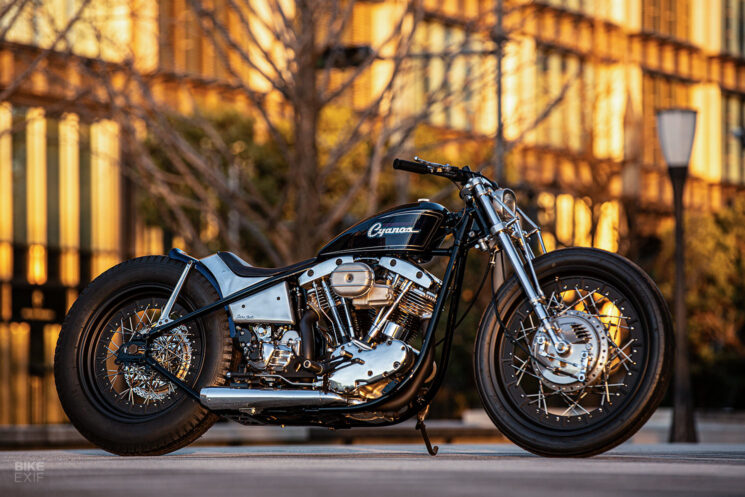
While trends come and go, bobber motorcycles have proven themselves to be a permanent piece of the motorcycle scene, and manufacturers worldwide have embraced the no-frills, stripped-back spirit. Factory bob-jobs come in all shapes and displacements these days, and the following machines are some of our favorite bobbers available for 2024.
- Harley-Davidson Street Bob 114
- Triumph Bonneville Bobber
- CCM Bobber
- Indian Chief Bobber
- Indian Scout Bobber
- BMW R12
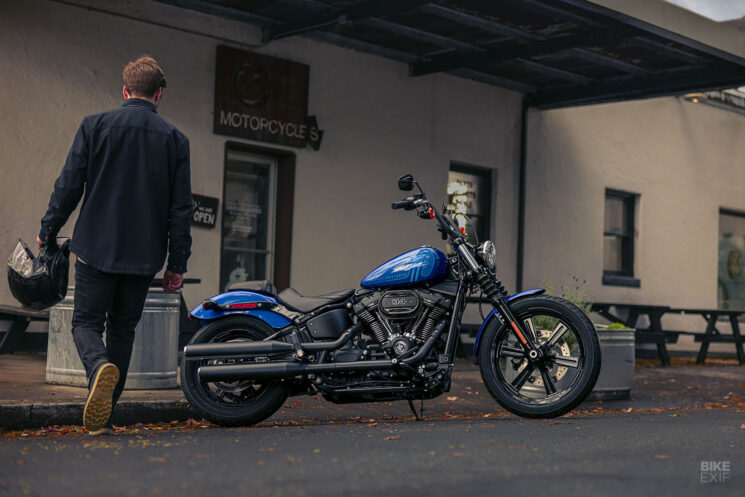
Harley-Davidson Street Bob 114
At a glance 1,868 cc, 45° V-twin engine, 94 hp, 161 Nm, 19″ F / 16″ R wheels, 49 mm telescopic forks, hidden coilover rear shock—43 mm stroke, solo seat with pillion pad.
Part of the scene since the very beginning, it would be a massive misstep in marketing for Harley-Davidson to ignore the bare-essentials crowd. The Sportster S, Nightster and Softail Standard make compelling cases, but if you’ve been around the block a time or two, the 114 ci Harley Street Bob is your no-frills steed.
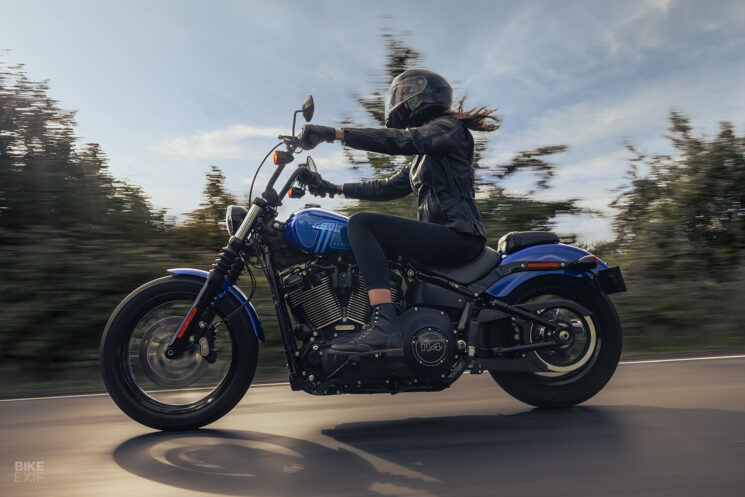
The Street Bob is based on Harley’s Softail chassis, which boasts a 43 mm coilover monoshock under the seat to preserve that classic HD frame line. Power comes from Harley’s 114 ci (1,868 cc) Milwaukee-Eight, with four valves per cylinder, electronic sequential port injection and a combination of air and oil cooling. Torque is the name of the game with this single-cam pushrod engine, and its 119 lb-ft pulls even certifiably husky riders around with ease.
Like the Softail Standard, the Street Bob ditches all the usual bulky kit people associate with the HD scene. Devoid of fairings and panniers, the Street Bob is only equipped with a 3.5-gallon fuel tank, a single seat with a removable pillion, bobbed fenders and a 2-into-2 shotgun exhaust.
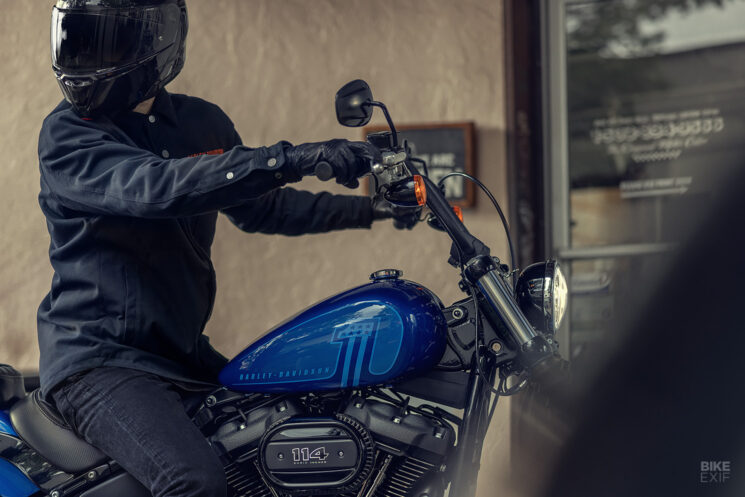
Electronics are also the bare minimum, consisting of standard LED lighting and a small display built into the bar clamp with eight basic functions. Hell, even ABS is optional.
When it comes down to brass tacks, the 2024 Street Bob enjoys a big leap in power and image over the Softail Standard, and costs the same as the Sportster S. Best of all, it looks just like a bare-bones Harley should. [Harley-Davidson | Custom Harley Street Bobs]
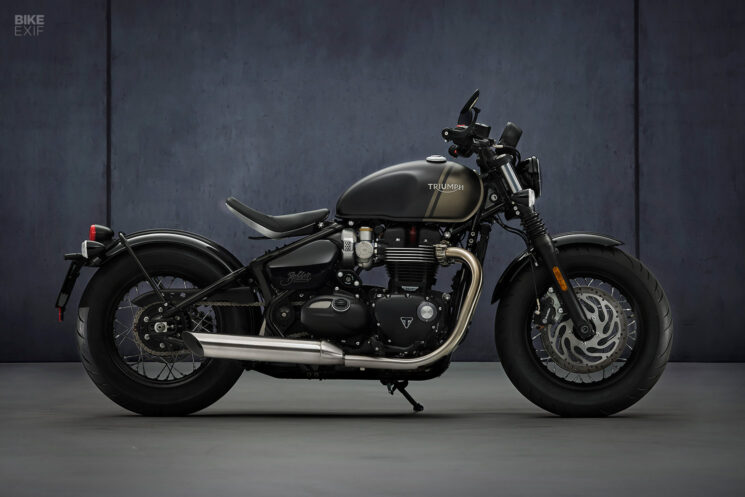
Triumph Bonneville Bobber
At a glance 1,200 cc parallel twin engine with 270° crank, 76.9 hp, 106 Nm, 16″ wheels, 47 mm right-side-up forks, hidden rear shock, cantilevered solo seat.
There are few more iconic powerplants in production today than the Triumph parallel-twin, and the retro air-cooled 1,200 cc engine is a prime candidate for a factory bob-job. While the bulk of its bits are borrowed from the Bonneville T120, this machine is far more than a Bonneville in bobber clothing.
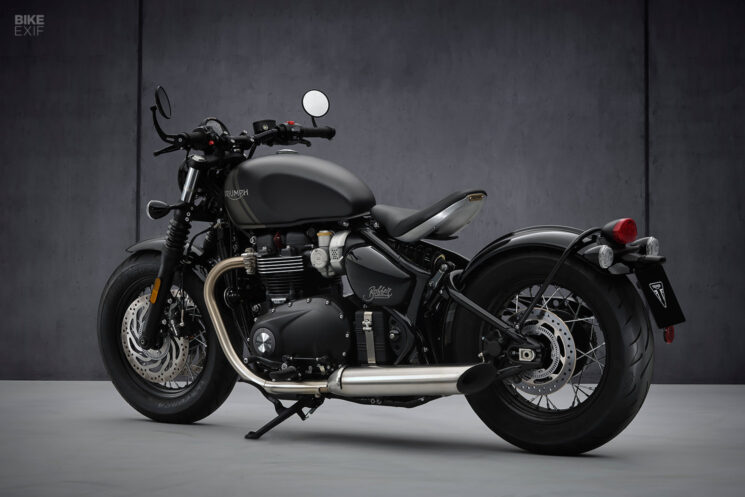
Right out of the gate, the Triumph Bonneville Bobber has a drastically different silhouette than the rest of the Bonneville stable, ditching the twin-shock swingarm for a fabricated monoshock unit. With the shock and linkage packaged tightly in the frame, the Bobber embodies the classic uninterrupted frame line from front to rear—even more so, with its slim single seat floating high above a Wassel-style fender out back.
While some slight repackaging is necessary under the saddle to accommodate its transition, the Bobber retains the T120’s carburetor-esque multipoint sequential injection system, and the revised battery mounting incorporates a retro band clamp tie-down. Dual slash-cut exhausts and chunky 16-inch wheels are unique to the Bobber, and foot controls are moved further forward.
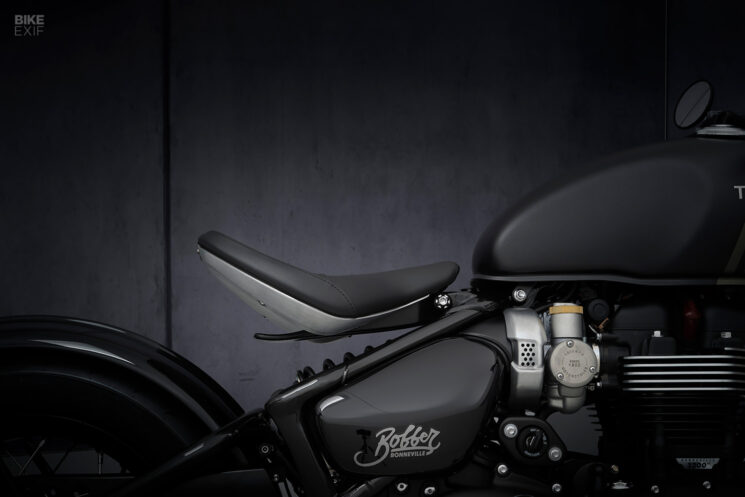
To go along with its low (but adjustable) 27.2 to 27.6-inch seat height, the Bobber is fit with low-rise bars and standard instrumentation—but there’s a fair amount of tech hiding there. Switchable riding modes, traction control, ABS, cruise control and an immobilizer are all standard fair on the Bobber.
The Bonneville Bobber is available in four striking colorways, all with a liberal application of matte black in the details. [Triumph | Custom Triumph bobbers]
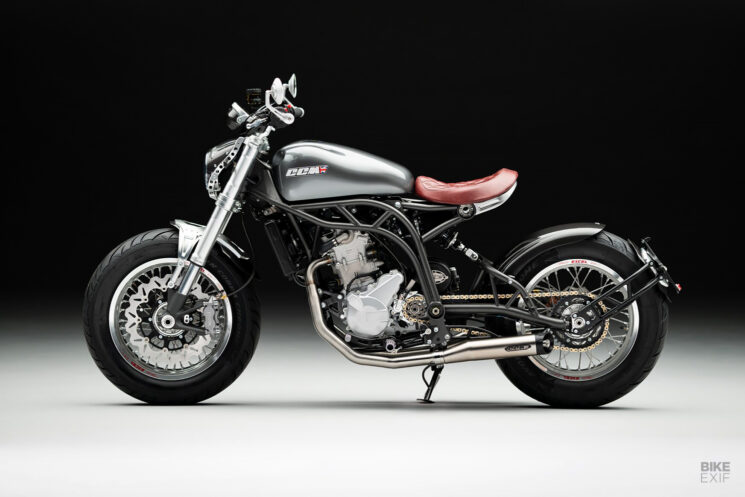
CCM Bobber
At a glance 600 cc Husqvarna four-stroke single, 55 hp, 55 Nm, 18″ Excel wheels, inverted forks—120 mm stroke, coilover rear—120 mm stroke, factory customizable.
Where many motorcycles affect the bobber aesthetic by shedding stock equipment, the design ethos at CCM Motorcycles is the bare essentials across the board. The CCM Bobber is a far cry from your average OE bobber, weighing just over 300 pounds and sporting a 600 cc four-stroke single, but considering its bespoke minimalist construction and impressive specification, we won’t argue with its credentials.
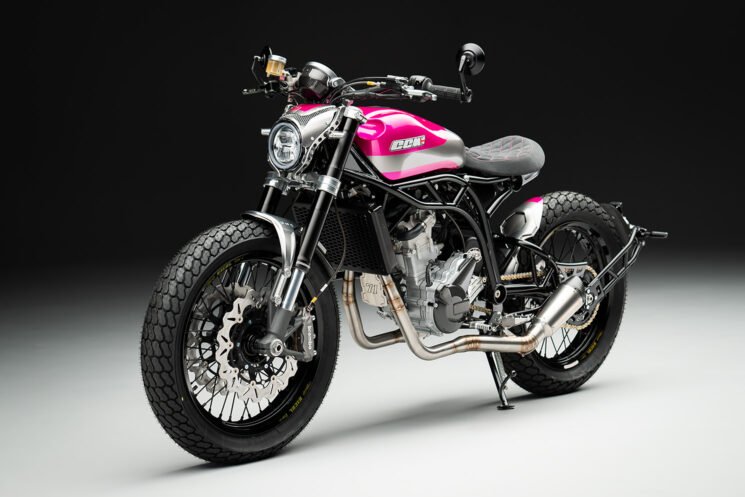
A boutique manufacturer based in Bolton, England, CCM’s model line focuses on a single versatile platform with a huge emphasis on customization. Most every CCM product could pass for a one-off when it leaves the factory, and owners covet the firm’s attention to handcrafted detail and top-spec materials.
All of CCM’s models utilize the same TIG-welded trellis frame, inverted front fork, fabricated monoshock swingarm and Husqvarna-sourced 600 cc engine rated at 55 hp. It’s the finishing details that define each model, and the Bobber makes its aspirations clear with a high-mounted single seat, shotgun pipes and 18-inch Excel wheels with thick Avon rubber.
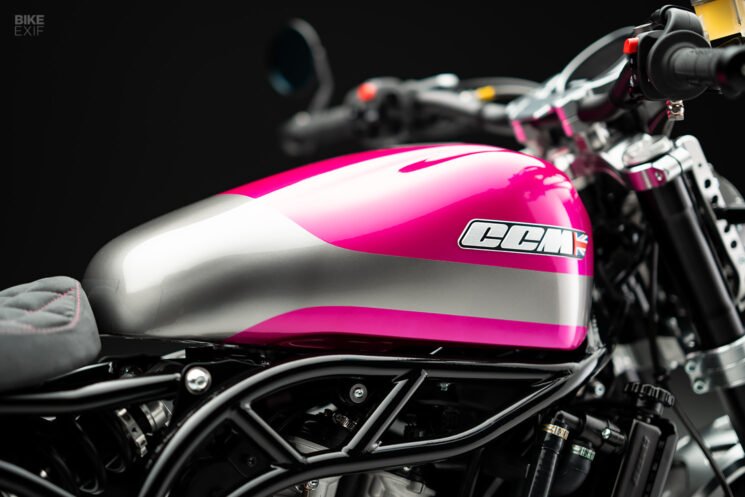
Its modest power output and upright ergonomics set the CCM apart from your average low-slung bobber, and the bike is better suited to short jaunts and corner-carving than the rest of the field. That being said, few factory offerings match CCM’s finishing details, and even fewer allow you to be so involved in the design process. [CCM Motorcycles | Custom CCM Motorcycles]
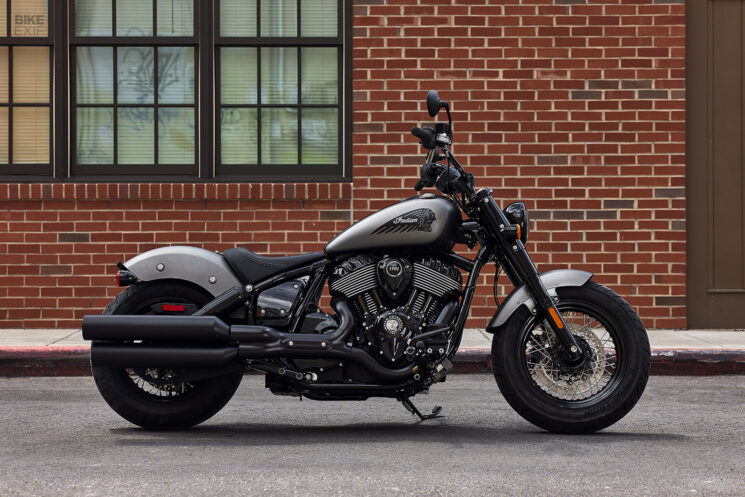
Indian Chief Bobber
At a glance 1,811 cc 49° V-twin engine, 146 Nm, 16″ wheels, 46 mm telescopic forks, dual rear shocks—76 mm stroke, forward foot controls.
Equipped with a 111-ci air-cooled mill, 16-inch wires and a timeless fuel tank design, the Indian Chief Bobber immediately makes the grade as a modern classic. Its nostalgic inspirations are more than skin-deep, but the Chief Bobber also comes with a decent amount of standard kit for the price.
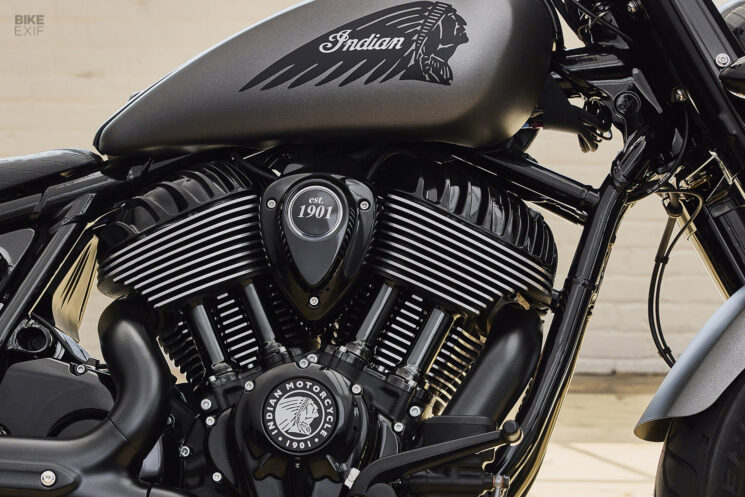
If you’re a fan of American motorcycles of the ’40s and ’50s, you’ll find a whole lot to like about Indian’s line of Chief cruisers. The bike’s silhouette is dominated by the air-cooled Thunderstroke 111 V-twin, which Indian rates at 108 lb-ft at 3,200 rpm. It’s topped by a nostalgic 4-gallon fuel tank, and all the Chiefs come with bobbed fenders and an eye-catching headlight nacelle as standard equipment. The Chief’s best feature, though, is one that’s not as immediately recognizable.
Looking past the bodywork, the bike’s steel tubular chassis looks genuinely classic. Instead of stamped or boxy sections, beautifully formed tube sections and joints are used, much like the brazed frames of yesteryear, and the rear shocks are worked into the uninterrupted backbone. With just 3” of travel out back, the Chief won’t return the smoothest ride when the going gets rough, but you could say the same for most bikes in this category.
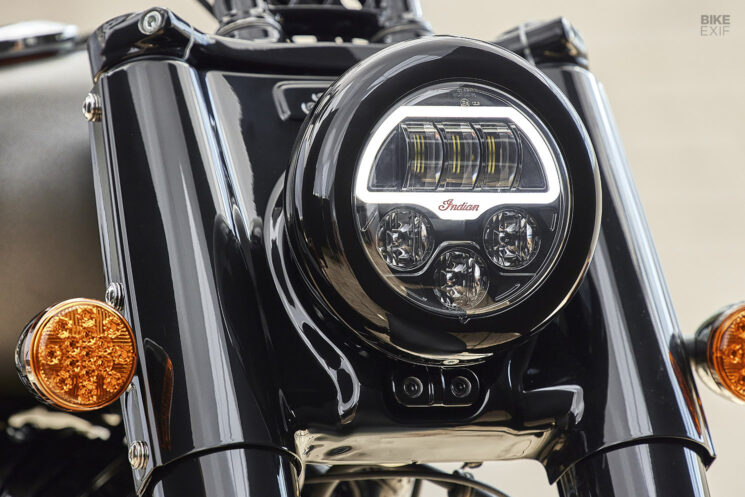
The Chief Bobber builds on the standard model in a few key areas for a subtle, but appreciable effect. Chrome exhaust covers surround the V-twin engine, running into blacked-out silencers. 16-inch wire wheels with black hoops and Pirelli Night Dragon rubber replace the standard alloys, and black shrouds cover the suspension front and rear for a smoother look.
The Chief Bobber sells for a small premium over the standard Chief, and they share the same gauge display and standard electronics. Cruise control, fuel range and ambient air temperature reporting are nice features compared to the competition, as are keyless ignition, switchable riding modes and rear-cylinder deactivation. If that’s not enough to trip your trigger, spec up to the Bobber Dark Horse model for 5 extra cubes and 120 lb-ft. After all, what’s a few thousand bucks among friends? [Indian | Custom Indian Motorcycles]
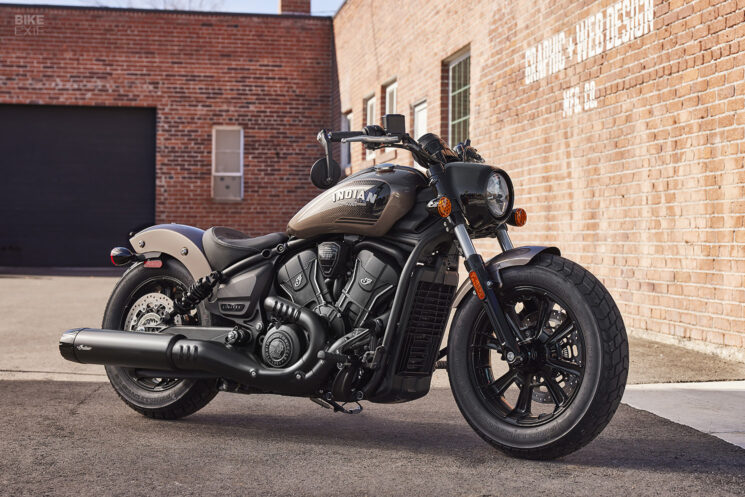
Indian Scout Bobber
At a glance 1,250 cc, 60° V-twin engine, 105 hp, 111 Nm, 16″ wheels, 41 mm telescopic forks, dual rear shocks—51 mm stroke, bar-end mirrors.
Chunky, blacked-out and slammed to the pavement, the Indian Scout Bobber is one of the most spirited mid-size machines on the market—and the new 2025 is hot off the press. While many updates for the current model appear only to the trained eye, the new Scout benefits massively from a sleeker chassis and bodywork, and a more powerful 1,250 cc engine.
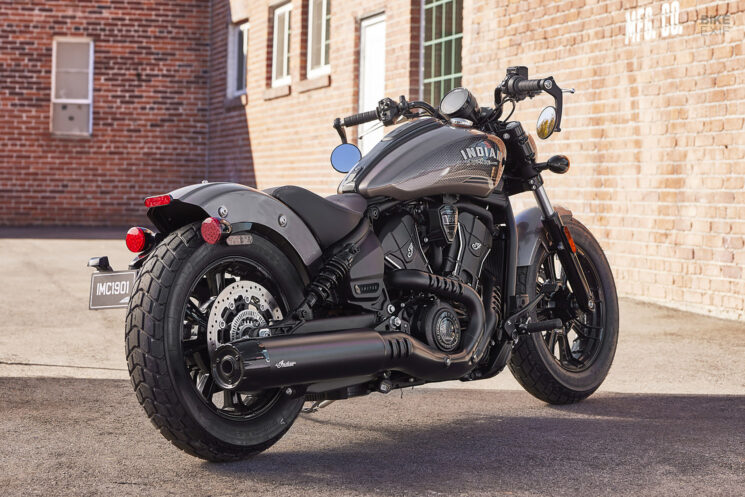
The Scout still serves as Indian’s most versatile platform, even after paring the model range back to five distinct machines. Despite its snazzier stablemates, the Scout Bobber remains an attractive option for everything it doesn’t have. There are no saddlebags, fairings or chrome bits, just a pair of bobbed fenders, a 3.4-gallon fuel tank and a small headlight nacelle.
The Bobber’s slammed stance comes courtesy of the 16-inch alloys fit front and rear with thick Pirelli rubber, and the rear coil shocks return just 2” of travel—a price to pay for curb appeal. Low-rise handlebars with bar-end mirrors front a single analog gauge with a small digital display—keeping track of the bare necessities.
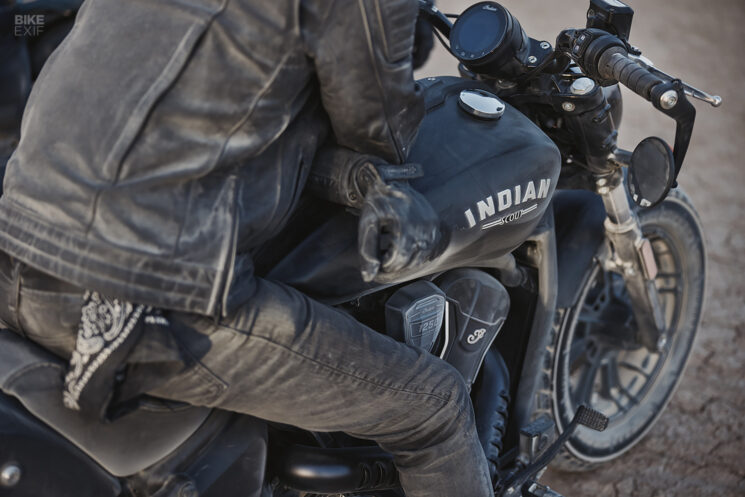
While the Scout’s basic layout remains the same, the new liquid-cooled SpeedPlus engine does away with the old mill’s machined and polished details for a more contemporary look. It also comes with an extra 117 cc of displacement, good for 105 hp and 82 lb-ft of torque, and you’re sure to feel an uptick in grunt over the outgoing model.
Indian’s designers have also done an exceptional job improving the chassis, which looks substantially more trimmed back, and likely contributes to the Bobber’s reduced curb weight of 542 pounds. In addition to removing bulk under the saddle and near the headtube, the new Scout’s fuel tank is inched back slightly to reveal the air intake, and the bobbed rear fender’s struts are hidden for a cleaner look.
The Scout Bobber is the most affordable (and arguably the coolest) machine in the model range, and now comes with standard ABS. [Indian | Custom Indian Motorcycles]
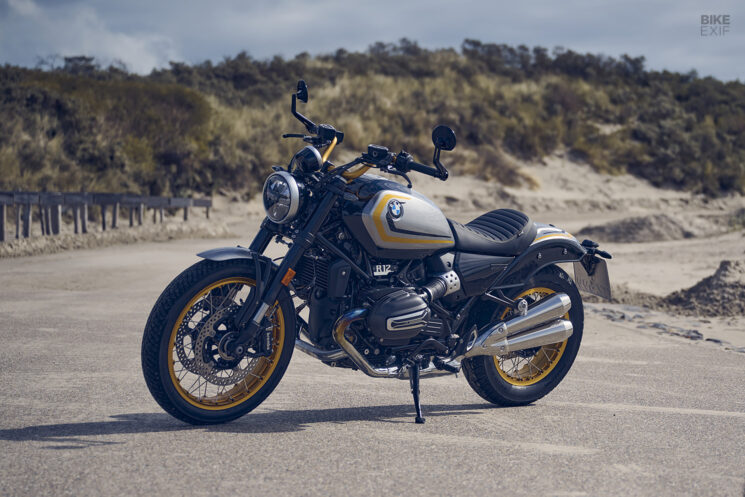
BMW R 12
At a glance 1,170 cc Boxer twin engine, 95 hp, 110 Nm, 19″ F / 16″ R wheels, 45 mm inverted forks, single-sided swingarm—89 mm stroke.
The new BMW R 12 is a cruiser through and through, but in standard trim off the lot, we think there are a few reasons it belongs on this list. Beyond its stripped-down spec from the flagship R 12 nineT, the R 12’s more relaxed geometry and chunky rear fender definitely blur lines between genres.
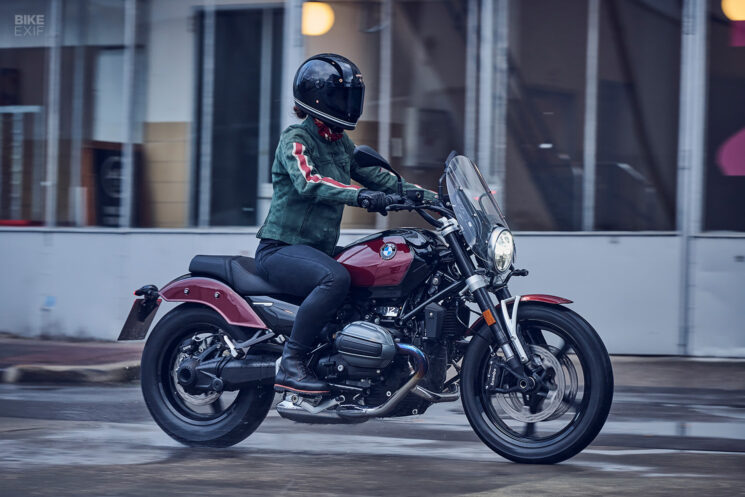
We dug deep into the R 12 back when BMW announced it in November, but if you’re looking for the cliff notes, here’s the gist. The new R 12 line builds on the outgoing R nineT’s 1,170 cc air- and oil-cooled boxer powerplant nestled in an all-new tubular-steel chassis. From there, BMW relocated the airbox to under the seat, and the suspension is adjustable on both ends with 17-inch alloys as standard.
With the R 12 nineT at the top of the range, the R 12 is spec’d down in several ways to account for its nearly $4,000 slash in MSRP. First off, the engine is offered in a more easygoing state of tune, producing 95 hp at 6,500 rpm, and the wheelbase, rake and seat height figures are softened slightly.
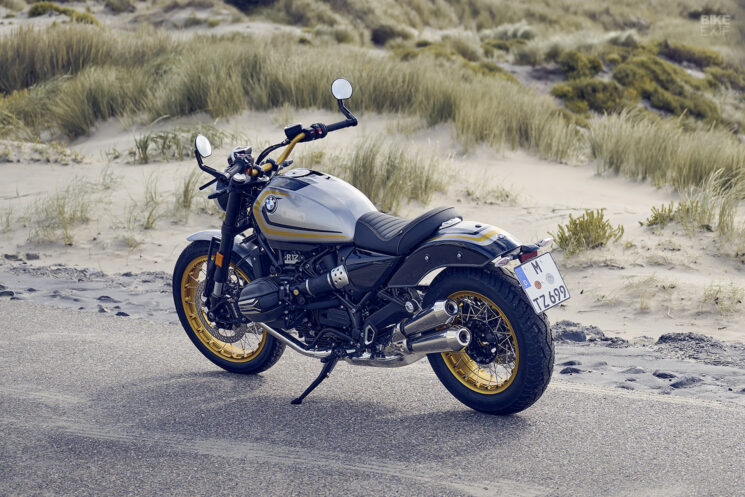
The inverted fork and rear monoshock return nearly the same amount of travel, but feature fewer knobs to turn, and the standard alloys measure 19”F and 16”R. In place of the nineT’s dual instruments, the R 12 has a single analog gauge with a small screen and two switchable riding modes titled ‘Rock’ and ‘Roll.’
As we’ve come to expect from BMW, there’s a load of custom options available for the R 12, including everything from eye-catching spoked wheels to exhausts, passenger accommodations and trick Option 719 CNC parts. Perusing the available add-ons, it’s clear you could cherrypick a few key options and have a real head-turner for less than the base R 12 nineT.
While it’s an entirely different animal from many of the other bikes on our list, BMW has clearly designed the new R 12 to be a more relaxed cruiser stripped back to the bare essentials—and they go as far as to use the word bobber as well. We won’t argue. [BMW Motorrad | Custom BMW Motorcycles]
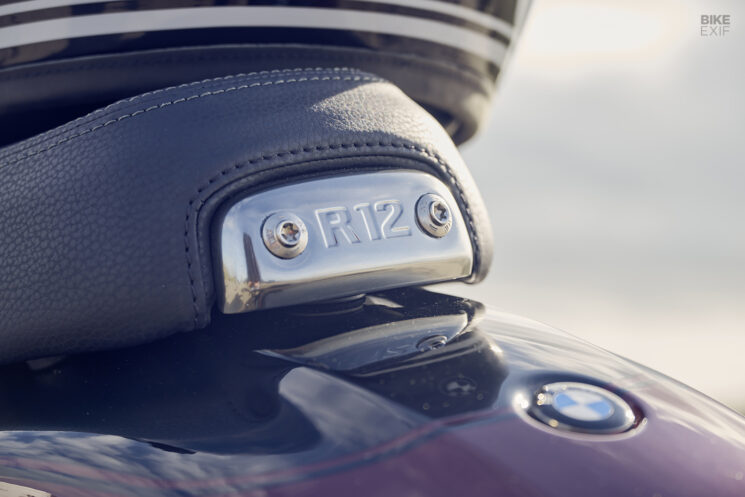
from Bike EXIF https://ift.tt/7xEDkZS
No comments:
Post a Comment